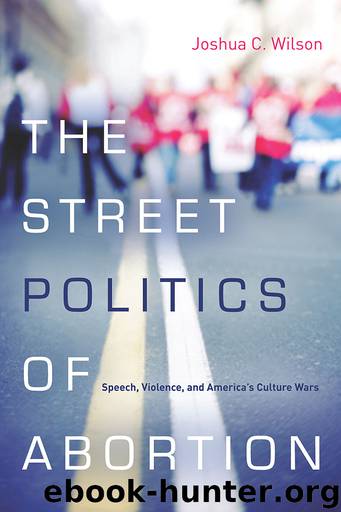Street Politics of Abortion by Wilson Joshua;

Author:Wilson, Joshua; [Wilson, Joshua C.]
Language: eng
Format: epub
Publisher: Stanford University Press
Published: 2013-03-16T16:00:00+00:00
6
Degrees of Separation
By shifting the focus away from traditional sources of legal meaning (e.g., judicial opinions) and toward individual stories, legal consciousness scholars make an overt attempt to understand legal power outside of the formal state. When selecting storytellers, then, these scholars gravitate toward those who are outside of the official legal apparatus. The previous chapter strayed slightly from this mold by targeting activists who were directly involved in court cases. In spite of this deviation, it returned to the traditional purview of legal consciousness research by focusing on the ways individuals, movements, and the formal legal system interact in the process of constructing and, in these cases, ultimately sustaining state law.
The current chapter maintains this connection with the traditional objectives of legal consciousness research, but it uses a starting point that directly assaults the approach’s norms. This chapter begins from the premise that legal consciousness research should not be limited to institutional outsiders. Building from this belief, the chapter examines how law is constructed in the stories told by three different types of state legal insiders, or elites.1 Specifically, this chapter looks at the stories told by legislative members, initial litigation and appellate lawyers, and amicus brief authors involved in Williams, Schenck, and Hill.
These actors all formally participate in the official creation and sustaining of state law through their institutional capacities. As a result, their role in the process of maintaining law’s authority seems obvious. This, however, oversimplifies matters. While they may be institutional insiders, these actors are still individuals who have the potential to think and behave independently and thus to challenge official state law. This is especially true within the United States’ decentralized governmental and adversarial legal systems. The potential for these elites to challenge the hegemonic conception of law that they also directly help to create is further heightened when competing social movements use these systems and employ these actors in their causes.
Legal insiders may arrive late to the movements that call on them, but they can play important roles not only in dictating movement strategy—a typical way in which they are examined in the law and social movements literature—but in forming activists’ perceptions, beliefs, and the vocabulary that they use to describe the events that they experience. For example, this is evident in chapter 5 when a clinic manager referenced time, place, and manner regulations. There is also no reason to assume that the road of influence is a one-way street. These elites are potentially susceptible to having their perceptions, beliefs, and language affected by their interactions with the activists. When this happens, it shows that there are bottom-up, not just top-down, effects when movements enlist elites. The range of possibilities for legal insiders to become part of challenging state legal authority, or alternatively to protect and impose this authority, complicates their position in relation to law. The stories that elites tell are therefore worth studying to see whether and how they, as Susan Silbey put it, “create, sustain, reproduce, or amend the circulating . .
Download
This site does not store any files on its server. We only index and link to content provided by other sites. Please contact the content providers to delete copyright contents if any and email us, we'll remove relevant links or contents immediately.
| Comparative | Conflict of Laws |
| Customary | Gender & the Law |
| Judicial System | Jurisprudence |
| Natural Law | Non-US Legal Systems |
| Science & Technology |
American Kingpin by Nick Bilton(3507)
Future Crimes by Marc Goodman(3367)
The Meaning of the Library by unknow(2385)
Inside the Middle East by Avi Melamed(2230)
Why Nations Fail: The Origins of Power, Prosperity, and Poverty by Daron Acemoglu & James Robinson(2172)
On Tyranny by Timothy Snyder(2127)
Living Silence in Burma by Christina Fink(1977)
Putin's Labyrinth(1901)
The Mastermind by Evan Ratliff(1828)
The Smartest Kids in the World by Amanda Ripley(1683)
Think Like a Rocket Scientist by Ozan Varol(1674)
Law: A Very Short Introduction by Raymond Wacks(1634)
The Rule of Law by Bingham Tom(1590)
It's Our Turn to Eat by Michela Wrong(1588)
Leadership by Doris Kearns Goodwin(1561)
Philosophy of law a very short introduction by Raymond Wacks(1539)
A Dirty War by Anna Politkovskaya(1539)
Social Media Law in a Nutshell by Ryan Garcia & Thaddeus A Hoffmeister(1449)
Civil Procedure (Aspen Casebooks) by Stephen C. Yeazell(1437)
